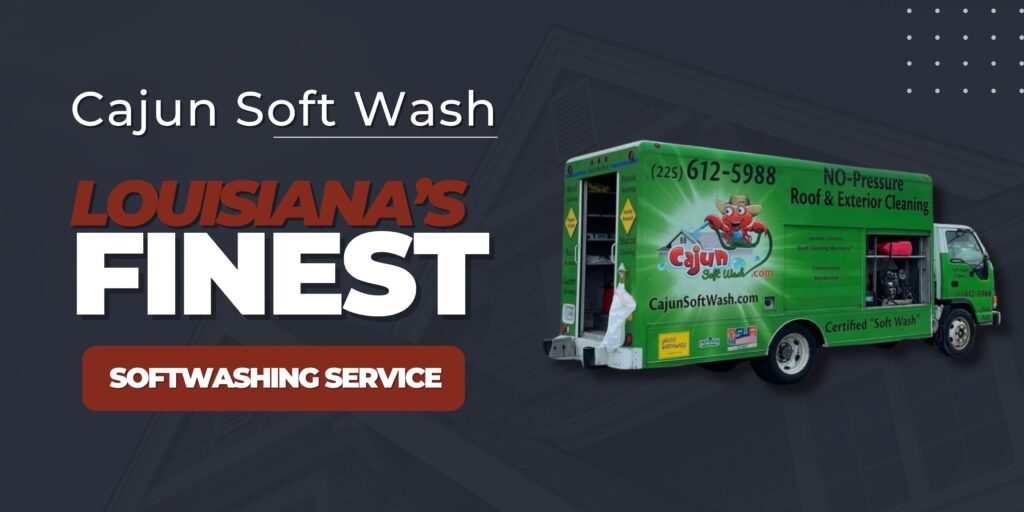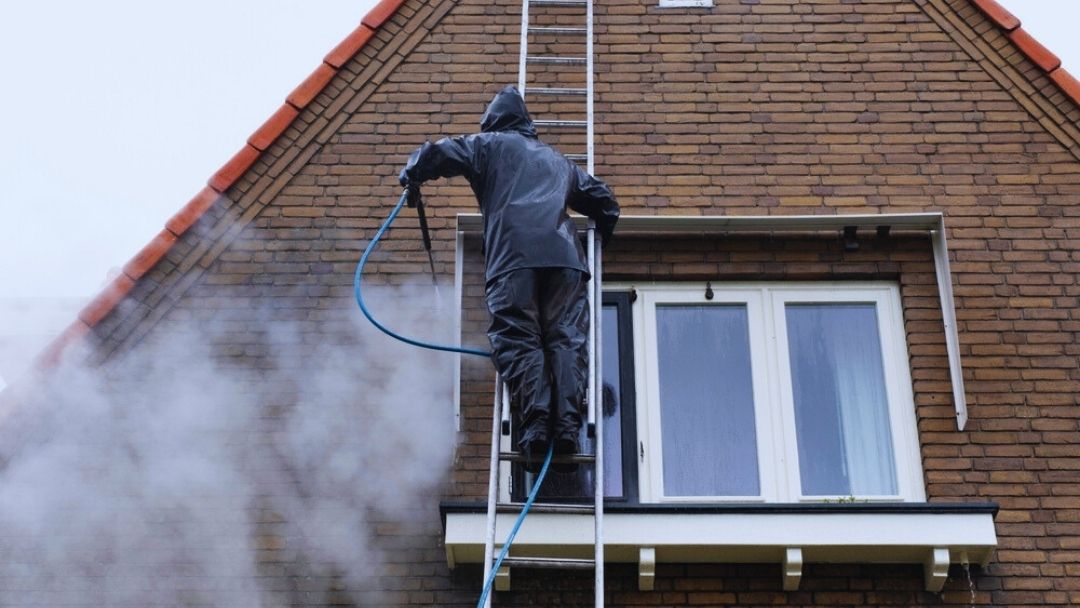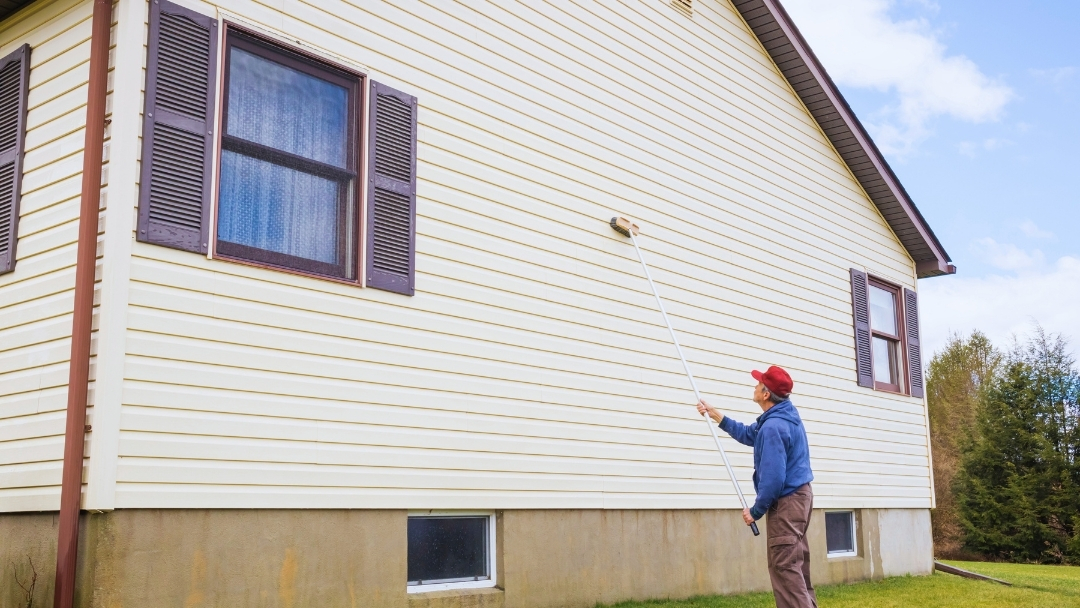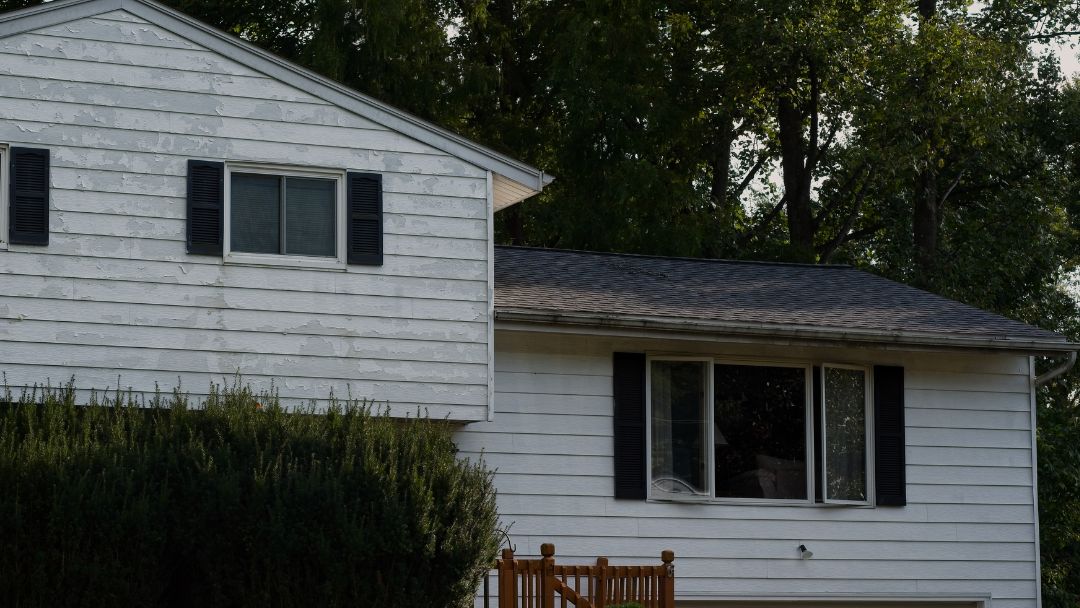Nobody talks about awning cleaning until their once-gorgeous outdoor shade looks like something from a horror movie. One day you’re enjoying your patio, and the next you’re staring up at streaky, moldy fabric that makes your whole house look neglected.
Here in Louisiana, this happens faster than you’d think. Between our swamp-like humidity, afternoon thunderstorms, and all that pollen floating around, your awnings are basically sitting ducks for every type of grime imaginable.
But most people mess up awning cleaning so badly that they end up with bigger problems than when they started. Torn fabric, permanent stains, water damage… The horror stories are real.
Why Louisiana Turns Awnings Into Science Experiments
Living down here means your outdoor stuff takes a beating, unlike anywhere else. Your awnings aren’t just dealing with regular dirt – they’re fighting a losing battle against nature itself.
Humidity is the Real Enemy
When the air feels like soup 90% of the year, mold and mildew don’t just grow on your awnings – they throw block parties. These aren’t just ugly stains either. They actually eat away at the fabric over time, turning your expensive shade into expensive garbage.
Everything Sticks to Everything
Pollen, bird droppings, tree sap, exhaust fumes – if it’s in the air, it’s landing on your awnings. Mix that with Louisiana moisture and you’ve got a recipe for permanent staining that laughs at garden hose rinses.
The Pollution Problem
Between industrial areas, heavy traffic, and general city life, there’s always something floating around that wants to make your awnings look terrible. That gray, dingy look? That’s not “character” – that’s years of airborne crud building up.
Different Awnings, Different Headaches
Not all awnings are the same, and boy, do they each have their own special ways to get ruined during cleaning.
Canvas awnings are like that friend who looks tough but is actually super sensitive. They’ll soak up water like crazy, shrink if you look at them wrong, and fade faster than a bad tattoo if you use the wrong cleaner.
Vinyl sounds bulletproof, right? Wrong. Hit them with a pressure washer and you’ll crack that protective coating faster than you can say “expensive mistake.” Then water gets underneath, and you’ve got a whole new set of problems.
Acrylic awnings are the prima donnas of the bunch. They resist fading pretty well, but scrub too hard and you’ll mess up that nice, even texture permanently.
Metal awnings seem like they can handle anything, but use the wrong chemical and you’ll have rust stains that make the original dirt look charming.
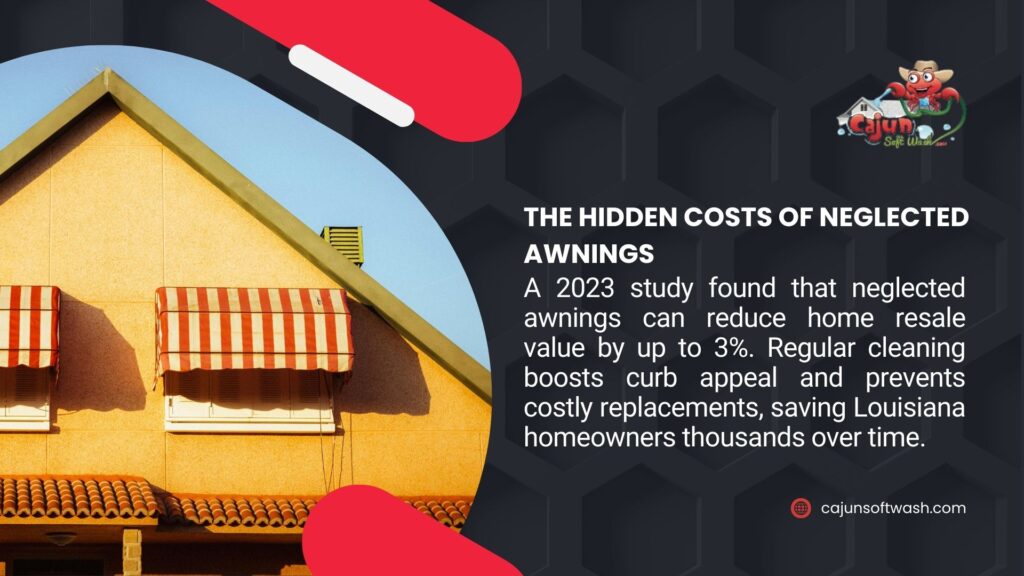
How the Pros Actually Handle Awning Cleaning
Real awning cleaning isn’t about blasting everything with the strongest pressure washer you can rent. It’s more like being a detective, a chemist, and a surgeon all at once.
The good guys start by figuring out what they’re dealing with. What kind of fabric? How old? What type of stains? Is that mold or just dirt? Each answer changes how they approach the job.
Then comes the chemistry lesson. Different problems need different solutions. You wouldn’t use the same stuff to remove bird droppings that you’d use for tree sap, right? Yet most homeowners grab whatever’s under the kitchen sink and hope for the best.
The real magic happens with low-pressure techniques – kind of like how stucco exterior cleaning works. The cleaning solution does the heavy lifting, not the water pressure. This way, you actually clean the awning instead of just pushing dirt around or punching holes in the fabric.
The Expensive Mistakes Everyone Makes
Most awning cleaning disasters happen because people think “more pressure equals cleaner results.”
The Pressure Washer Disaster
Nothing ruins awnings faster than someone with a pressure washer and confidence. You’ll force water through seams, tear fabric, strip protective coatings, and generally turn a cleaning project into a replacement project. Just like pressure washing stucco is a terrible idea, pressure washing awnings is asking for trouble.
Playing Mad Scientist with Chemicals
Bleach seems like it should work on everything, right? Tell that to the homeowners staring at their newly tie-dyed awnings. Or the ones who used toilet bowl cleaner and watched their metal hardware dissolve. Some cleaning products are just too aggressive for awning materials.
The “Just Let It Air Dry” Mistake
Leaving cleaning chemicals on fabric while it bakes in the Louisiana sun is like setting stains in concrete. And rolling up wet awnings? That’s how you get that musty smell that never goes away, plus bonus mold growth in places you can’t even see.
Why Chemistry Actually Matters
The difference between amateur and professional awning cleaning comes down to understanding how cleaning actually works at a molecular level. Sounds fancy, but it’s pretty straightforward.
Professional solutions are designed to break surface tension – that’s science talk for “getting into all the tiny spaces where dirt hides.” Regular soap just sits on top and hopes for the best.
Then there’s the pH balance thing. Most awning materials have a sweet spot where they clean well without getting damaged. Too acidic and you weaken fibers. Too alkaline and you strip protective treatments. Most household cleaners are way outside this sweet spot.
The best professional cleaners break down naturally after they finish working. So they clean your awnings without poisoning your landscaping or the storm drains.
Your Year-Round Awning Battle Plan
Louisiana weather means your awnings never really get a break, but some seasons are definitely worse than others.
Spring hits you with pollen bombs and the return of everything that was dormant all winter. This is prime time for deep cleaning before summer gets serious.
Summer is survival mode. Those afternoon thunderstorms might rinse off some surface dirt, but they also create perfect conditions for mold to explode. Monthly check-ups can catch problems before they become disasters.
Fall brings leaf debris and birds doing whatever birds do (usually on your clean awnings). It’s also when you want to prepare for the milder winter months.
Even Louisiana winters aren’t really “off season” for awning problems. Less humidity, sure, but this is actually the perfect time for major cleaning and repairs since you’re probably not using your outdoor spaces as much.
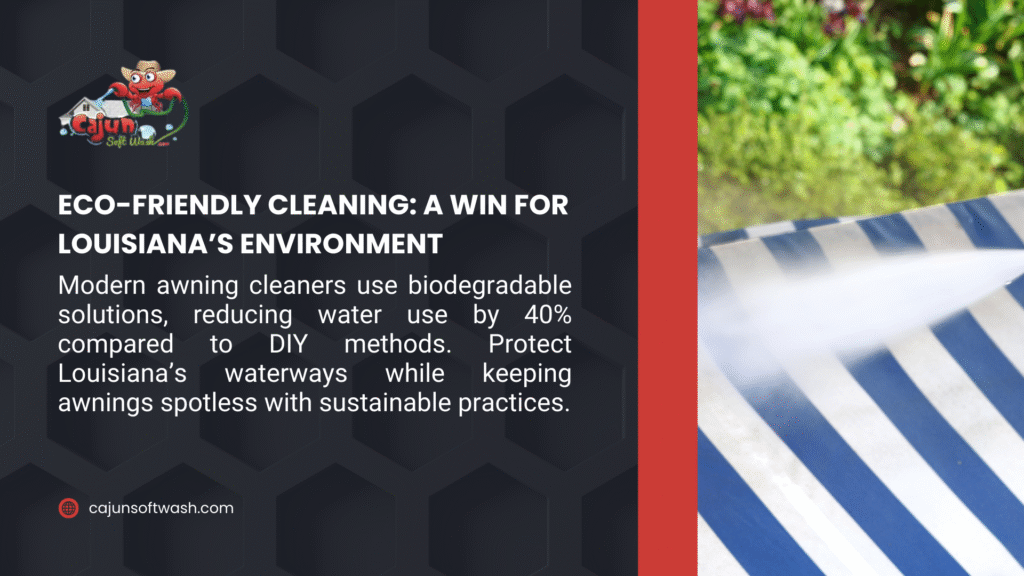
The Health Stuff Nobody Talks About
Dirty awnings can actually make your family sick. Mold spores floating around your patio don’t stay outside. They drift into your house and mess with indoor air quality.
Plus, when awnings get structurally weakened from neglect or bad cleaning, they can literally fall down. That’s not just embarrassing – it’s dangerous.
And all those harsh chemicals people use for DIY cleaning? They don’t magically disappear. Kids and pets play in areas where chemical runoff goes, and nobody wants to explain that emergency room visit.
The Money Talk
Professional awning cleaning costs money upfront, but it saves money long-term in ways that actually matter.
A good cleaning can literally double how long your awnings last. When you’re looking at replacement costs in the thousands, professional maintenance suddenly looks pretty smart.
Clean awnings also work better. They reflect heat properly and provide the shade they’re supposed to provide. Dirty awnings can actually make your cooling bills higher because they don’t block the sun effectively.
And if you ever sell your house, well-maintained awnings make your property look cared for. Gross awnings make buyers wonder what else you’ve neglected.
When Things Get Complicated
Some awning problems need special attention beyond regular cleaning.
Grease stains from outdoor cooking areas are stubborn and need enzyme cleaners that break down organic compounds. Regular detergent just smears them around.
Paint splatters happen during house projects, and removing them without damaging awning fabric requires solvents that most people shouldn’t handle without proper training.
Rust stains from metal components are another specialty job. You need products that remove rust without corroding the metal or staining the fabric further.
The Environmental Angle
Professional awning cleaning is about not poisoning your yard in the process.
Water conservation matters, especially when you’re dealing with the volumes needed for proper awning cleaning. Professionals use precise amounts instead of just hosing everything down and hoping.
Modern cleaning products break down naturally instead of building up in soil and groundwater. That matters more than you might think, especially in Louisiana, where everything eventually ends up in our waterways.
Proper disposal of contaminated water and materials prevents environmental problems that can come back to bite you later.
Making It All Work Together
Smart homeowners don’t think of awning cleaning as a separate project. It works better as part of taking care of your whole exterior.
Timing awning cleaning with other exterior work like stucco cleaning makes sense financially and practically. You get better deals and avoid having clean awnings get dirty from other cleaning projects.
Professional services coordinate the order of operations so you don’t end up with freshly cleaned awnings getting contaminated by runoff from roof or siding cleaning.
New Technology Makes a Difference
The awning cleaning industry keeps getting better equipment and products that deliver superior results with less environmental impact.
Modern cleaning chemistry is way more effective than the harsh stuff from even a few years ago. These new formulations clean better while being safer for materials and people.
Professional equipment gives precise control over pressure and chemical application. That precision prevents damage and ensures consistent results.
Quality control systems help professional services deliver the same high standards every time, with procedures designed to catch potential problems before they become expensive mistakes.
Knowing When to Call the Professionals
Some situations clearly call for professional help instead of DIY heroics.
| When You Need Pros | Why DIY Won’t Work |
| High or large awnings | Safety equipment and ladder skills required |
| Expensive or antique materials | One mistake can cost more than professional service |
| Heavy mold or severe staining | Professional-grade solutions and techniques needed |
| Insurance or warranty concerns | DIY damage might void coverage |
| Time is money situations | Professionals finish faster and better |
| Health issues in the family | Professional safety measures protect sensitive people |
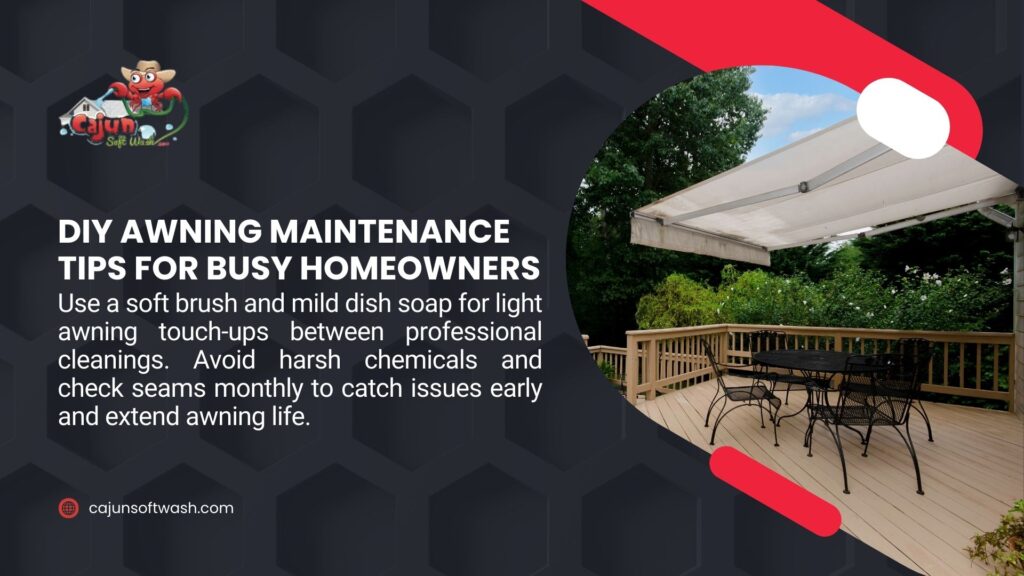
Making the Smart Call
Your awnings represent real money – money you spent on comfort, energy savings, and making your outdoor spaces enjoyable. Just like you wouldn’t clean your house’s stucco with whatever’s handy, awning cleaning deserves the right approach.
Professional awning cleaning protects your investment while delivering results that actually last. It keeps your family safe and your property looking the way it should.
Time to Get Those Awnings Looking Right Again
Stop putting up with awnings that make your house look neglected. Every day you wait, the problems get worse and harder to fix.
Professional awning cleaning brings the right equipment, proven methods, and experience to handle Louisiana’s unique challenges. The best services understand local conditions and have the specialized solutions needed to restore awnings without causing damage.
Quality professionals are fully insured, properly trained, and stand behind their work with guarantees that give you confidence in the results.
Contact Cajun Softwash to schedule your awning cleaning service and see why Louisiana homeowners trust professional exterior cleaning to keep their homes looking their best. Your awnings deserve proper care, and your family deserves to enjoy clean, safe outdoor spaces.


